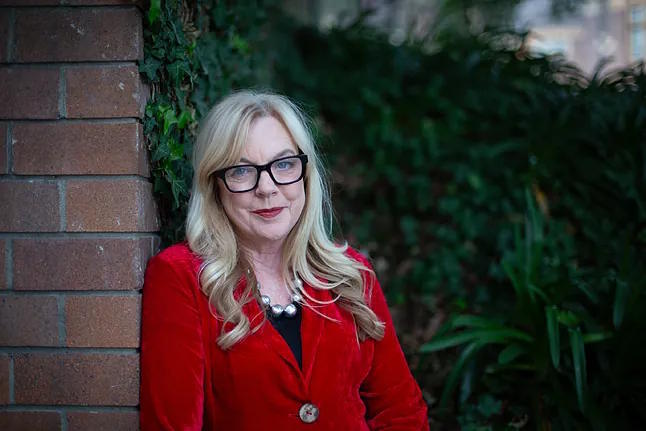"The real truth does not exist, only the legal truth does." This is well known by Tessa Ensler, a renowned lawyer sought after by sexual offenders to defend them in court. Because if there's one thing Tessa is known for, it's her ability to interrogate victims in court, delve into their contradictions, and the holes in their confusing testimonies. Tessa knows well that legal truth prevails. So much so that she herself ends up being a victim of a rapist.
Tessa is the protagonist of the successful Prima Facie, the play about sexual consent that Australian playwright Suzie Miller brought to stages in Sydney, London, or New York (in Spain, it was presented by Vicky Luengo). The story is now published as a novel (Seix Barral publishing house), coinciding with the trial for Luis Rubiales' kiss to Jenni Hermoso. "Why do women have to protect themselves from male desire? It's men who should control themselves," Miller states in a video conference interview.
The writer also knows about legal truth because she was once a lawyer herself. "The law says we are all equal before the law... if we are men," she laments. "The legal system has been designed by generations of men, generally white and privileged," which has made it difficult to prove the truth of a raped woman. At first glance, prima facie, nothing is as it seems.
"Prove. Prove. If the story has holes, they are pointed out. Because what is at stake is not just your case, but the law. And laws are there to protect us all," Tessa explained to an intern. But that was before she became the raped and questioned woman. By the way, the lawyer Tessa knows how she would interrogate the victim Tessa: "You almost took off all your clothes yourself, is that correct?"
"No matter what the truth is," Miller acknowledges, "what matters is what can be proven in court." The author even admits that women are more likely to believe men's version. How is this possible when one in three women has experienced some form of sexual assault? "My mother and my grandmother grew up in a world where the rule that bad women were raped and good women were not was accepted. Traditionally, shame has been borne by women," she responds. Her Tessa goes further: "If that woman [raped] is telling the truth, we should all examine our past and perhaps also the actions of our sons, husbands, and brothers. Perhaps it's easier to think that the woman is exaggerating."
And she continues: "In this era where women have autonomy over their sexuality and are on dating apps, there is no reason to lie about a sexual assault." Why bear the guilt and face judicial martyrdom if not to prove a truth? Miller precisely gives the example of Rubiales' trial, which has gained international attention along with the argument that it's the footballer who is exaggerating a kiss. "We don't blame someone who gets punched in the face as if it were their fault."
Miller, advocate of consent based on "only yes means yes," wonders why it's still so difficult for many men to understand its meaning. "Isn't it amazing? If you struggle so much to understand what consent is, don't have sex. You have no right to access someone's body, because that implies understanding that the person you're having sex with has feelings."
From her experience as a lawyer, Miller asserts that many men accused of rape lie when they say she consented. "In some way, they believe it's okay not to ask women and play the ignorance card. Deep down, men have thought for centuries that if a woman doesn't say no a hundred times, it's a yes."
"Why do women have to protect themselves from male desire? It's men who should control themselves"
And this is how Tessa's story is a paradox. That of her coworker, whom she falls in love with but who ends up raping her. He is Julian, another renowned lawyer who gives lessons on how to win a trial defending a rapist: "When the debate revolves around consent, you don't have to prove that she gave it, just that he didn't know there was no consent. That it was reasonable for him to think he could do what he did." The ignorance card buries the woman's version.
Miller also mentions the "old myth that women cannot be raped if they have already said yes." For men, she insists, "changing their minds is challenging because until the last century, they were allowed to have sex whenever they wanted. It was the woman's responsibility to protect herself from men's desires."
And in some way, we still carry on old beliefs. "When a woman reveals she has been a rape victim to someone in her circle, often the first question is: 'Why were you with him?' I don't know any woman who goes out expecting to be raped. No matter what clothes you wear, what you drink, or say. When you say stop, there is no consent."
Even within marriage. For Miller, the fine print of the marriage contract is perverse: "As soon as someone consents to marry, what they are doing is consenting to have sex at the will of the person they are married to for the rest of their life, so there is no rape by the man if he obtains that consent."
How to prove that there wasn't? The book, which Miller dedicates to "all the women who are one in three," invites collective reflection. It's not just about changing laws, but about fostering social change. "One in three are many women with something to say. Too many to ignore."
